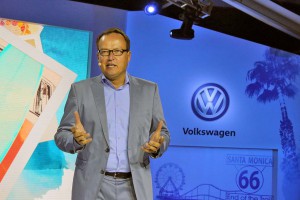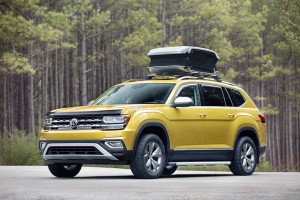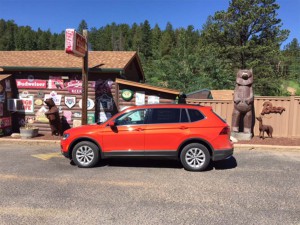Things didn’t look very good when Hinrich Woebcken landed in the U.S. two years ago as the new CEO and President of the Volkswagen Group of America. The automaker had just acknowledged cheating on diesel emissions tests and was not only facing the prospect of paying billions of dollars in fines and settlements but a collapse in its U.S. sales as it was forced to pull off the market all of its popular diesel models.
“The only reason dealers didn’t kill me was that I was the new guy,” the German-born executive said, only half joking, during a presentation at the Automotive News World Congress on Tuesday afternoon.
These days, dealers are a lot more sanguine about Woebcken, and VW in general, though the VWoA chief cautioned that the automaker has a long way to go before he can claim success rebuilding its U.S. operations.
(Live from Detroit! Click Here for our complete 2018 auto show coverage.)
For 2017, Volkswagen scored record global sales topping 10 million and pushing it past Japanese rival Toyota to become the world’s largest automaker. In the U.S., sales rose 5.2% for the year, but with total sales for the flagship VW brand of just 339,676 vehicles, it lagged well behind market leaders like General Motors, Ford, Toyota and Honda. In fact, the German marque sold barely half as many vehicles as it did at its peak, back in the 1960s and 1970s, when its market share topped out at around 5 percent.
That was the era when the Beetle singlehandedly defined the Volkswagen brand. VW currently sells a third-generation version of its iconic Bug, but its little more than an asterisk on the sales charts these days. And VW’s other passenger cars don’t do all that much better.
The future for VW, stressed Woebcken, is to catch up with the changes sweeping through the broader U.S. market. And it has begun to do so by expanding its line-up of utility vehicles. That includes an all-new and larger version of the compact Tiguan model – while retaining the classic version of the ute as an economy offering for buyers on a budget. But even more important has been the addition of the Atlas, its new three-row SUV.
Sometimes, it’s the little things that matter, Woebcken told his audience, like moving away from “the typically German name…breaking the tongue” that the parent automaker originally had in mind. No Tiguan, no Touareg, but an American-sounding name for a vehicle specifically defined for the American market and built at the company’s plant in Chattanooga, Tennesse.
Together, Woebcken said, the two new crossover-utility vehicle “stand for a turnaround story.”
At least the start of one, anyway. Woebcken revealed that “two more SUVs will come to market…by the end of the decade.”
(VW isn’t abandoning sedans. Click Here for a look at the sporty new Passat GT.)
In reality, adding more utes is only part of the turnaround process. VW has had to address several other issues that have long held it back. The new CEO took aim at the maker’s reputation for quality issues and a high cost of maintenance by launching one of the industry’s best warranty programs.
And he also acknowledged that VW was tripping over its own feet by insisting it could get away with charging a premium of $4,000 to $5,000 for its products by claiming that was the cost of German engineering.
“Here in America,” he said, “we had to recognize we had to face the competition” at a comparable price.
(VW topples Toyota, likely led global sales chart for 2017. Click Here for the story.)
As the latest sales numbers show, VW is finally regaining some momentum, no small achievement considering the overall decline of the U.S. market. But it still has a long way to go to just catch up with its past success and ensure that Woebcken won’t have to worry about angry dealers.
(This story first appeared in The Detroit News.)



